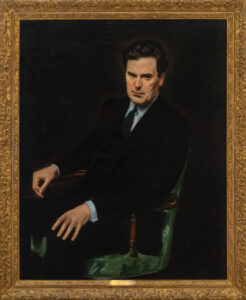 Thomas Meighan (April 9, 1879 – July 8, 1936) was an American actor of silent films and early talkies. He played several leading man roles opposite popular actresses of the day including Mary Pickford and Gloria Swanson. At one point he commanded $10,000 a week. Meighan was elected to The Lambs in 1906. He served as Shepherd 1924-1926. Meighan was named the 15th Immortal Lamb.
Thomas Meighan (April 9, 1879 – July 8, 1936) was an American actor of silent films and early talkies. He played several leading man roles opposite popular actresses of the day including Mary Pickford and Gloria Swanson. At one point he commanded $10,000 a week. Meighan was elected to The Lambs in 1906. He served as Shepherd 1924-1926. Meighan was named the 15th Immortal Lamb.
***
From The Lambs Script, 1954 January-February Issue
Thomas Meighan served The Lambs as Shepherd in 1924-1926. Though he died in 1936, the family name has been represented in the Fold by his brother, John A. Meighan; his nephew, James E. Meighan, Jr. since 1924, and his brother, James E. Meighan, Sr. of 1911, when the latter served as treasurer for ten years from 1943 to 1954. It was under Jim’s treasurership that the Old Mortgage was lifted, and it was under Jim’s regime that many members observed the fine qualities of his brother Tom, qualities which were recognized by the Council when he was chosen as the fifteenth Immortal.
Thomas Meighan was the first motion picture actor to be elected Shepherd, though really he began his acting stint on the legitimate stage. He was born in Pittsburgh on April 9, 1879. His father was the owner of John A. Meighan Foundry Supplies and Tom’s early background foreshadowed anything but a stage career. After his public school days Tom refused to go to college so his father set him to work shoveling coal. This was not to the young man’s liking, so he willingly enrolled at Mount St. Mary’s College, Emmitsburg, Maryland. He graduated from there and took up work in the theatre.
When a kid, the legitimate theatre claimed young Tom Meighan for its own; first as a juvenile in Henrietta Crossman’s Company for two years, and then with Grace George with whom he made his first Broadway appearance as Colonel Gorda in His Majesty the Queen of Nordenmark. Then came The Dictator with William Collier, Sr., and an all-star revival of The Two Orphans. When The College Widow as being cast, George Ade found his ideal handsome half-back in Thomas Meighan, and the “widow” in that production found Tom his ideal gal, Frances Ring, sister of Blanche Ring, who made the song “Rings on My Fingers, Bells on My Toes” famous. Theirs was the perfect marriage so often heralded but seldom realized, in the movie colony; a union that enabled Mrs. Meighan to carry on the charitable work which Tom made so great a part of his unpublished life.
For several years Tom appeared with David Warfield, and in 1914 went to London for a long engagement in the character of Robert Wallace in Seymour Hicks’ production of George M. Cohan’s Broadway Jones. George Ade, who became one of Meighan’s closest friends, said of him, “Tom is always modest, good natured, and kind. Although he is one of the highest salaried actors in the world he is deserving of all his success, and that success has been well earned.”
Tom’s first venture in the movies was in 1916 when he appeared opposite Laura Hope Crews in The Fighting Hope, and he began the steady rise in importance which culminated in his stardom in The Miracle Man. He was destined to hold the pinnacle as cinema’s top man in box office success as well as popular vote for over a decade, likely a record never duplicated since.
In 1924 Tom was elected Shepherd of The Lambs. He is said to have been more proud of this mark of distinction by his fellow actors than of any other event in his career. That he filled the office to perfection is expressed by the comment of the New York Tribune: “In that famous organization of the theatre, Thomas Meighan was held in such high esteem that his administration was an outstanding success.” Our annals also show that during his tenure of office a substantial payment was made on the mortgage. Also under his regime the 1925 Meighan Gambol at the Met netted $70,000, which broke all records for a gambol. Fifty thousand was invested in the lounge furnishings which are still in service.
Tom’s final role in pictures was that of Jackie Cooper’s father in Peck’s Bad Boy, released in 1934. Illness then prevented a continuation of the career which carried him from romantic leading man to kindly, graying father without a single break in his popularity or drawing power. He passed away at his home, Glenwolde, Great Neck, July 8, 1936. He was 57.
Among the many tributes paid him no one was truer than, “He played only one big part in his life, but that was a fine and manly role, for it called upon him to be himself,” said Booth Tarkington. Also said the playwright, “Thomas Meighan was the pleasantest, friendliest, kindliest, and most thoughtful of men–he has something finer than his good looks–his unconsciousness that he possessed them.” According to his Brother Lambs of his era, ”Tommy was the kind of actor that every actor hopes some time to be–a great performer and a great man with a great heart.”